I am using popular JSON schema library - json-schema-validator - for checking incoming payloads against a schema of my own.
The following is summary of my grief:
private final JsonSchemaFactory factory = JsonSchemaFactory.byDefault();
private JsonSchema preparedSchema;
public ReportByTeamCriteriaSchemaChecker(String schemaLocationPath) {
try {
JsonNode schemaNode = JsonLoader.fromPath(schemaLocationPath);
this.preparedSchema = this.factory.getJsonSchema(schemaNode);
} catch (ProcessingException | IOException e) {
e.printStackTrace();
}
}
There isn't any problem, till here. The Schema file is found in its designated location, and the schemaNode is prepared.
Given an incoming JSONString (the payload, to be more definite), this is how I confirm its correctness against the schema loaded earlier:
private Try<ProcessingReport> checkAgainstSchema(JsonSchema schema, String jsonifiedString) {
Try<ProcessingReport> result =
Try
.of(() -> JsonLoader.fromString(jsonifiedString))
.mapTry( (jsonNode) -> schema.validate(jsonNode));
return (result);
}
This function, is called thus:
Try<String> syntaxParsingresult =
this.checkAgainstSchema(this.preparedSchema, jsonifiedString)
.map(e -> extractErrorMessagesFromReport(e));
The relevant portion of the build.gradle file:
sourceCompatibility = '1.9'
targetCompatibility = '1.9'
[compileJava, compileTestJava]*.options*.encoding = 'UTF-8'
if (!hasProperty('mainClass')) {
//ext.mainClass = 'test.NewMain'
mainClassName = "drivers.ReportServerEntryPoint"
}
repositories {
mavenCentral()
maven { url "http://maven.restlet.org" }
}
ext.restletVersion = "2.3.10"
// ........
// https://mvnrepository.com/artifact/com.fasterxml.jackson.core/jackson-databind
compile group: 'com.fasterxml.jackson.core', name: 'jackson-databind', version: '2.9.8'
// https://mvnrepository.com/artifact/com.fasterxml.jackson.core/jackson-core
compile group: 'com.fasterxml.jackson.core', name: 'jackson-core', version: '2.9.8'
// https://mvnrepository.com/artifact/com.fasterxml.jackson.core/jackson-annotations
compile group: 'com.fasterxml.jackson.core', name: 'jackson-annotations', version: '2.9.8'
// https://mvnrepository.com/artifact/commons-io/commons-io
compile group: 'commons-io', name: 'commons-io', version: '2.6'
compile(group: "com.github.java-json-tools", name: "json-schema-validator", version: "2.2.10")
// https://mvnrepository.com/artifact/io.vavr/vavr
compile group: 'io.vavr', name: 'vavr', version: '0.9.2'
This works perfectly fine (including all testcases) when run from inside IntelliJ IDEA. However, when I build the JAR and run from the command line, the exception thrown is very confusing:
The source-line that is found offensive by JVM (ReportByTeamCriteriaSchemaChecker.java:59) corresponds to the the function call mentioned earlier:
schema.validate(jsonNode)
I am using vavr - and thus, I suspected initially if vavr and json-schema-validator and Jackson were uncomfortable being together - but I have confirmed that even when I don't use vavr's Try, the exception is thrown at the runtime.
I referred to this conversation on StackOverflow, but is of very little use to me.
I am using JDK 1.9:
java version "9.0.1"
Java(TM) SE Runtime Environment (build 9.0.1+11)
Java HotSpot(TM) 64-Bit Server VM (build 9.0.1+11, mixed mode)
Could anybody, familiar with JSON Validation, point me to the right direction?
Update:
As an experiment, I added the following to the dependencies:
dependencies {
compile(group: "com.github.fge", name: "jackson-coreutils", version: "1.8");
}
In this case, when I run the JAR from command line, the error message is exactly reversed:
Caused by: java.lang.IncompatibleClassChangeError: Found interface com.github.fge.jsonschema.main.JsonSchema, but class was expected
at com.oneHuddle.application.utility.schemaChecker.ReportByTeamCriteriaSchemaChecker.validateAgainstSchema(ReportByTeamCriteriaSchemaChecker.java:59)
at com.oneHuddle.application.ReportByTeamResource.lambda$getDefaultTeamReport$0(ReportByTeamResource.java:60)
at io.vavr.control.Either.flatMap(Either.java:331)
at com.oneHuddle.application.ReportByTeamResource.getDefaultTeamReport(ReportByTeamResource.java:59)
If anything, I am more confused! :-) Why should it run alright from inside IntelliJ but throw this error when an executable JAR is run from the command line?
